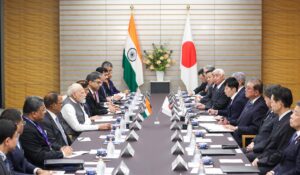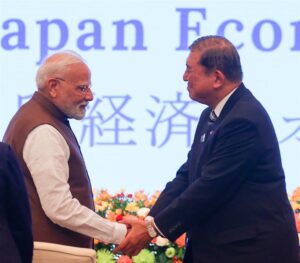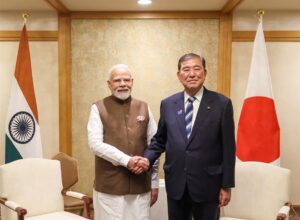India and Japan Unveil Joint Vision for the Next Decade, Set Roadmap for Deeper Strategic, Economic, and People-to-People Ties
India and Japan on Friday announced an ambitious Joint Vision for the Next Decade, laying out a comprehensive framework for cooperation across eight priority areas ranging from trade, technology and health to ecological sustainability, mobility, and people-to-people linkages. The vision document was formally adopted during Prime Minister Narendra Modi’s visit to Tokyo for the Annual India-Japan Summit 2025 at the invitation of his Japanese counterpart, Prime Minister Ishiba Shigeru, on August 29-30.

The two leaders reaffirmed their shared commitment to a free, open, peaceful, prosperous, and rules-based Indo-Pacific, while underlining that the India-Japan Special Strategic and Global Partnership has entered a transformative phase. The roadmap seeks to harness the complementary strengths of the world’s fourth and fifth largest economies and bring their peoples “closer than ever before” over the next decade.
Addressing the joint press meet with PM Ishiba.@shigeruishiba https://t.co/84iLYW7lkT
— Narendra Modi (@narendramodi) August 29, 2025
Eight Pillars of Cooperation
The vision statement identifies eight broad “lines of effort” that will guide bilateral cooperation until 2035.

1. Next Generation Economic Partnership
India and Japan will double down on trade and investment linkages, with Japan setting a new target of JPY 10 trillion in private investment in India, building upon the earlier 2022-26 commitment of JPY 5 trillion. The partnership will also review the Comprehensive Economic Cooperation Agreement (CEPA) to expand trade, encourage SME collaboration, and boost food security and agri-business ties. Cooperation on payment systems, ICT, and financial services at GIFT City will also be scaled up. Both sides agreed to work jointly in Africa under the India-Japan Cooperation Initiative for Sustainable Economic Development, leveraging India’s MAHASAGAR vision and Japan’s Indian Ocean-Africa initiative.
2. Next Generation Economic Security Partnership
A new India-Japan Economic Security Initiative will focus on resilient supply chains for critical goods such as semiconductors, critical minerals, pharmaceuticals, biotechnology, and clean energy. Collaboration on Artificial Intelligence (through the Japan-India AI Cooperation Initiative), telecommunication, and battery supply chains will be expanded, alongside greater private sector participation facilitated by JETRO, CII, and JCCII.
At the 15th India-Japan Annual Summit in Tokyo, PM @narendramodi and PM @shigeruishiba reviewed bilateral ties and agreed to further strengthen the Special Strategic and Global Partnership.
They outlined priorities including investment, innovation, technology, health, mobility… pic.twitter.com/kfnFnhK0qW
— PMO India (@PMOIndia) August 29, 2025
3. Next Generation Mobility
The two countries will launch the Next Generation Mobility Partnership (NGMP), covering high-speed rail, advanced metro systems, AI-driven rail maintenance, transit-oriented development, and urban decarbonisation. Cooperation will also extend to smart cities, cold-chain logistics, disaster-resilient transport infrastructure, and manufacturing of vehicles and aircraft in India for global markets.
4. Next Generation Ecological Legacies
Both sides committed to advancing climate and environmental cooperation through Mission LiFE, the India-Japan Clean Energy Partnership, waste-to-energy technologies, biodiversity protection, agroforestry, and green hydrogen. Joint efforts will also target marine ecosystem preservation, sustainable agriculture, and multilateral environmental leadership under initiatives like LeadIT.
5. Next Generation Technology and Innovation Partnership
India and Japan will deepen scientific collaboration in areas such as quantum computing, space technologies, fission and fusion energy research, and food technology. A special emphasis will be placed on startup ecosystems, with the Japan-India Startup Support Initiative (JISSI) and a new “fund of funds” to mobilise capital for tech-driven entrepreneurs. The LUPEX lunar mission will be a flagship space cooperation project.
6. Investing in Next Generation Health
Health cooperation will cover universal health coverage (UHC), pandemic preparedness, clinical research, geriatric medicine, regenerative therapies, and digital healthcare. Traditional and alternative medicine will also find a place, with India’s AYUSH Ministry supporting the establishment of yoga, meditation, and ayurveda centres in Japan.
7. Next Generation People-to-People Partnership
The most ambitious target comes in human resource mobility: an exchange of 500,000 personnel within five years, including 50,000 skilled Indian workers moving to Japan. New educational and cultural exchange programmes, Japanese language training, tourism promotion, and fellowship opportunities will cement stronger grassroots ties. Initiatives like the India-Japan Talent Bridge and expanded Sakura Science and EDU-Port Japan projects will reinforce this dimension.

8. Next Generation State-Prefecture Partnership
Recognising the role of local governments, India and Japan will promote new sister-city and state-prefecture partnerships, expand direct flight connectivity, and facilitate greater exchanges between regional governments. Regular visits by state and prefectural delegations will be institutionalised, with three visits planned annually from each side.
A Partnership for the Indo-Pacific and Beyond
Officials said the Joint Vision was not only about bilateral ties but also about shaping a cooperative Indo-Pacific order. By linking Indian and Japanese strengths in technology, innovation, infrastructure, and human capital, the two sides aim to present a model of sustainable development for the Global South, particularly Africa and South Asia.
The vision also places emphasis on multilateral engagement—whether through the Sendai Framework for disaster risk reduction, cooperation in global health governance, or coordination in environmental platforms.
Looking Ahead
Prime Minister Modi hailed the roadmap as a blueprint for the “next generation of India-Japan friendship,” while Prime Minister Ishiba described it as “a commitment to co-create solutions for regional and global challenges.”
By adopting this forward-looking vision, the two countries have effectively signaled that their partnership is no longer confined to traditional areas of diplomacy and defense but is set to evolve into a people-centered, innovation-driven, and globally responsible alliance for the 21st century.
|Also Read : India Aims to Double Bilateral Trade with Africa by 2030: Piyush Goyal |
|Also Read : Time to take Indo-Japan ties to next level |













